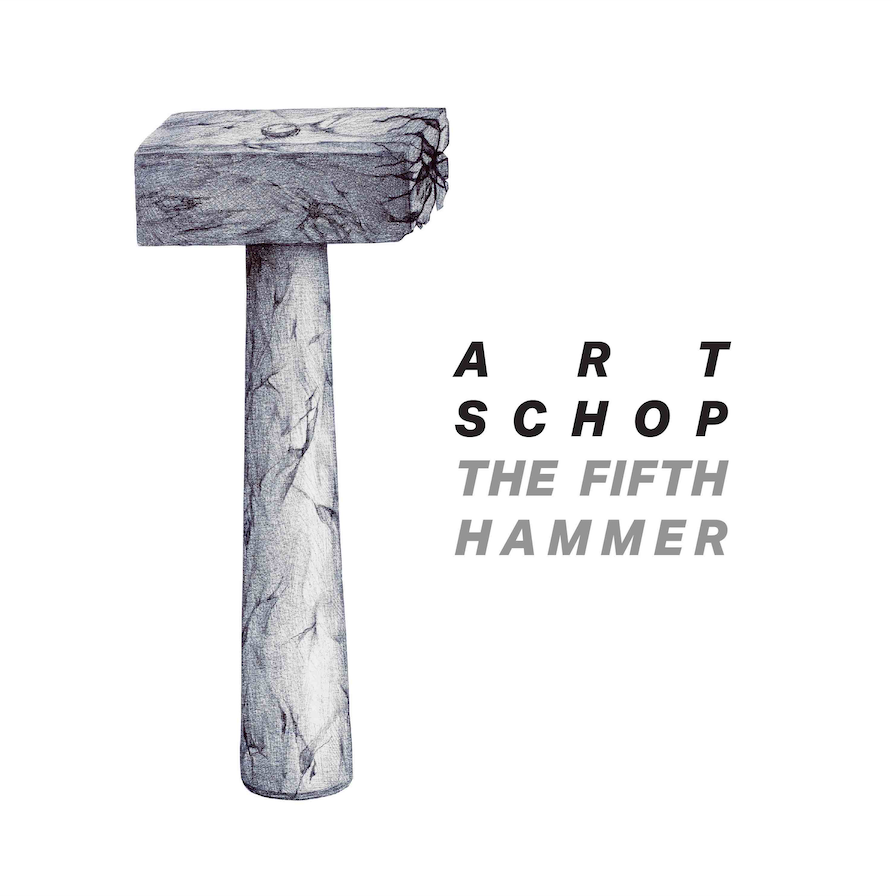
Art Schop just dropped “The Fifth Hammer,” and it’s a jackhammer wrapped in a rock ‘n’ roll skin. Martin G. Walker’s fifth studio opus is a 44-minute thesis on cosmic dissonance, delivered with the swag of a pub philosopher and the sonic heft of a band tearing down walls. And yeah, he’s the band. Mostly.
Walker ain’t your average basement bard. Dude’s a reformed Oxford physicist, ex-global-law-tech mercenary, and brain-training entrepreneur who ditched the spreadsheets to howl into the void as Art Schop—a moniker nodding to Arthur Schopenhauer, history’s favourite pessimist. That pedigree bleeds into every note. Walker writes, arranges, and plays nearly everything: guitars that snarl like rusty nails, basslines thicker than Nietzsche’s moustache, piano keys that echo in cathedrals of doubt, and a baritone that’s Johnny Cash meets Nick Cave at a midnight séance. Only when the songs demand artillery does he call in reinforcements: Chris Heinz (drums/percussion) and Nathaniel Wolkstein (violin/viola). The result is meticulous chaos. Mixed by Mark Nevers (Bonnie ‘Prince’ Billy, Lambchop), it’s stark, deliberate, and alive—like a blueprint for a skyscraper drawn in blood.
So, what’s the hammer about? Buckle up. The title and core concept snag from Daniel Heller-Roazen’s book “The Fifth Hammer: Pythagoras and the Disharmony of the World.” The story goes: Pythagoras hears five blacksmiths hammering in perfect harmony. Except… he realises only four are in tune; the fifth is discordant, an outlier. He dismisses it. Mistake. That fifth hammer, by being different, was actually essential to the unique beauty of the whole sound. Boom. That’s the album’s central thesis: the world’s inherent disharmony, the outliers, the suffering, the shit that doesn’t fit – it’s not a flaw to be discarded, it’s fundamental to the messy, chaotic symphony of existence. Walker, directing Schopenhauer’s pessimism, runs with this through ten tracks that dissect historical fuck-ups and personal failings with dark humor and steady honesty.
The album kicks off with the slow-burn menace of “All Philosophy Worth the Name.” It’s a slow-burn opener. Walker’s baritone booms over ominous chords—philosophy with calluses and a switchblade. Sets the tone: stark, human, heavier than a tombstone. You feel the weight immediately – this is philosophy with dirt under its nails. “Snow Falling” follows, its 4:10 runtime suggesting another layer of this wintry contemplation. Then comes the shimmering beauty of “Katharina,” a track very “gentle and beautiful.” It tells the true story of Katharina Kepler, the astronomer’s mother, tried as a witch in the 17th century and defended by her son using reason against superstition. Dreamy, evocative, yet grounded in brutal historical reality – pure Schop magic.
The heart of the concept arrives with the two-parter: “Me, My Lover; Her Love: Part 1” and “Me, My Love; Her Love: Part 2”. Part 1 is where Pythagoras meets a messy love triangle. Walker reportedly spins a tale of a lover with another lover, contemplating the “irrational number” of the hypotenuse – a brilliant, witty metaphor for emotional chaos leading directly to the discovery of the forge and the fateful dismissal of the fifth hammer (“What do we do with the fifth hammer, We cast it away, into the river“). Part 2 shifts perspective to the blacksmith who used the fifth hammer, watching it get tossed, resignedly observing “Some people don’t want to believe that the world has no rhyme or reason, the hammers fall as they may, making noise, not music.” Set to a “haunting musical background,” this duo is the album’s abstract core, jamming personal heartache with grand philosophical error.
“The Only Answer” lures you in with pleasant strings before revealing its dark lyrical core – another courtroom scene painted with unsettling imagery. “Oslo to Copenhagen” sits at track five, a title suggesting movement, a journey mirroring the album’s intellectual trek. Then we hit the slacker anthem “The Underachiever.” THE SONG THAT SLAYS. A slacker anthem rejecting Leibniz’s “best of all possible worlds” bullshit. Walker’s logic? “If god allowed the Holocaust, malaria, and famine / Surely, I can have a glass or two of wine… If god is an underachiever, why can’t I be one too?” It’s a “damn you!” to perfectionism, a gloriously relatable embrace of flawed humanity set to what’s likely a deceptively catchy tune. Brilliant.
“Nietzsche’s Horse” tackles Nietzsche’s breakdown—embracing a whipped horse, then silence. Sonic anguish meets poetic grace. Heavy as a headstone. Expect this to be heavy, poignant, and sonically arresting. The album closes with “The Soul is Not a Number,” described as riding a “low-slung acoustic guitar” with half-spoken vocals and wistful piano. On the surface, it debates Euler and Kant on colour theory while begging for human kindness: “So why would I correct her? / Do I need to correct her, just to be right?” A raw plea for compassion over cold logic.
This is an album for those who like their rock served with brains and balls. It’s challenging, thought-provoking, and ultimately deeply rewarding. Martin Walker, as Art Schop, is forging a unique sonic philosophy, hammer by hammer, song by god-tier song. “The Fifth Hammer” is a towering achievement – 44 minutes proving rock can be as intellectually potent as it is viscerally electrifying.
